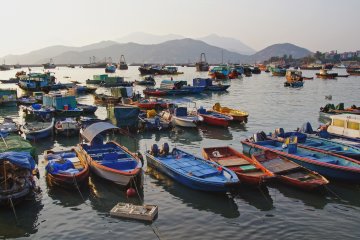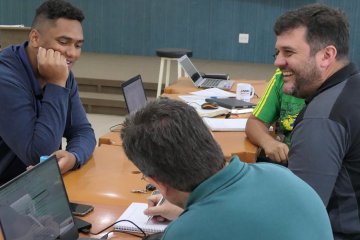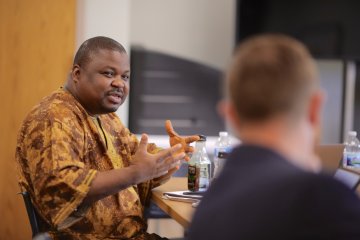The Kingdom Advances through Diasporas
Wesley came from Malaysia to study at a university in Des Moines, Iowa. He had a privileged path. He secured the coveted H-1B visa, which is only given to highly skilled professionals. A business guaranteed him a job and paid over $6,000 to sponsor him.
Pastor Salai came from Myanmar (which he still refers to as Burma) as a refugee in 2009 after studying in India and then moving to the Midwest by way of Malaysia. Salai's path to citizenship is less complicated because he is a refugee. But he still faces ethnic prejudice—prejudice among different Burmese people groups in his city, and from more established groups of people, white and non-white.
But Wesley and Pastor Salai are not merely immigrants; they're Christians involved in the local church and part of God's kingdom. While they didn't move from their homelands intending to be missionaries, in a way, they are.
Throughout history God has grown his kingdom through diasporas—peoples scattered outside their homelands. He sometimes commissions them to go. For example, God called Abram to leave Haran for Canaan (Genesis 12:1–3; 15:7). Other times, God scatters people to judge them. Some examples are Babel (Genesis 11) and the Jewish exile (see Deuteronomy 28:64). God even uses persecution and suffering perpetrated by others to spread the gospel, as in the early days of the church in Jerusalem (Acts 8:4; 11:19).
What we learn from Scripture is that, whenever people leave and wherever they land, God is responsible (Acts 17:26). People may leave because of preference, family ties, drought, crime, injustice, or wars and unrest. But even so, God in his wisdom providentially causes all these events to occur. Joseph saw the world through this lens. He invited his family to Egypt because of famine in Canaan (Genesis 45–46), but he recognized God had sent him there to save their lives (Genesis 45:6–7). God also brought Wesley and Salai to Des Moines. Trusting that he will accomplish his purposes (Isaiah 46:10), we can notice, serve, and collaborate with dispersed peoples to advance God's kingdom.
Notice Immigrants and Refugees
You probably live near a refugee family, a foreign student, or an immigrant professional. Simply noticing them—stopping to talk or asking questions—disarms and dignifies them. We can help ease the stress of settling into a strange, new culture. We can learn their names and open ourselves up to them. We can treat immigrants and refugees as more than a statistic. There are more than 258 million of them worldwide, but each of them is made in God's image. They are people with their own stories and their own gifts to share. Some may even be our sisters or brothers in Christ.
Have you noticed people like Pastor Salai and Wesley where you live? They are our neighbors, faithfully living for Christ Jesus, boldly proclaiming the gospel. Millions of people encounter Christ because immigrants and refugees scattered around the world tell them about him. When we notice that God is working through diasporas, we are more open to leaving our ethnocentric enclaves. We are more open to collaborating with diaspora peoples and championing multiethnic ministry. We are more open to learning from them and partnering with them.
“When we notice that God is working through diasporas, we are more open to leaving our ethnocentric enclaves. We are more open to collaborating with diaspora peoples and championing multiethnic ministry.”
Rejoice, Serve, Collaborate
Noticing immigrants and refugees will inevitably lead to action. Jesus pushed his disciples to care for others—even their enemies (Matthew 5:44–46). The good Samaritan first took pity on the wounded stranger before he did anything to help (Luke 10:33). Our goal is not to guilt the church into action, compiling a list of past failures. Rather, our goal is to encourage the church to humbly take an open posture toward immigrants and refugees, getting to know them and seeing how many are already serving the Lord in our communities. This posture best leads to actions we can take.
First, let's rejoice that God is working to advance his kingdom through displaced peoples. Understanding a bit more of their situation will also lead us to empathy and even lament. This will then give us the opportunity to look for ways to serve them—befriending them, teaching them English, or even sheltering them. But our diaspora brothers and sisters also have much to offer us. They are indispensable to the body of Christ. We should collaborate with them and their churches to advance the kingdom.
When we do so, we should start with relationships. Westerners are pragmatic and often rush into projects without realizing the necessity of building trust through relationships. So we need to slow down. One approach is to share meals with diaspora families, inviting them to our home and extending hospitality. Look for ways to hear from them and earn their trust.
One specific way to work with diaspora church leaders is by partnering with TLI's Diaspora Training program. It aims "to promote a healthy movement of diaspora pastors in order to empower them to study and proclaim the Scriptures, developing the next generation of church leaders as we work together for the sake of the gospel." Individuals, organizations, and churches can use their resources to equip diaspora church leaders to faithfully proclaim the truth of Scripture. And, in the process, they have the opportunity to learn from diaspora pastors and churches. We all have blind spots, but by God's grace those can be removed through collaboration and relationships centered around the word of God.
What an opportunity and reason for hope! God is building his multiethnic church through diasporas, bringing his rule and reign (to our own neighborhoods) through the prayers of his scattered people who witness faithfully and proclaim the gospel. God is fueling worship from every tribe and tongue as he gathers "the dispersed of Israel" (Isaiah 56:8) and adds to their number by calling sheep near and far—even those who have been displaced (John 10:16).



